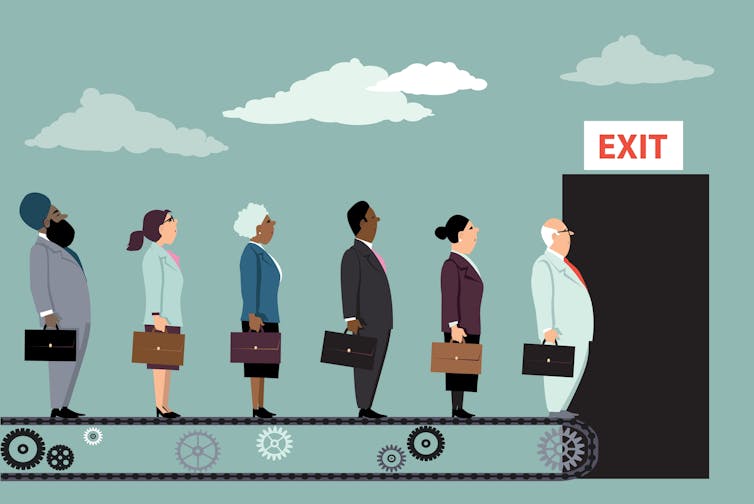
Hananeko_Studio/Shutterstock
John-Paul Byrne, RCSI University of Medicine and Health Sciences
How do you feel about your work? Do its daily demands leave you burned out and drained of energy?
Do you find yourself reducing how much effort you make to engage in some “quiet” or “soft” quitting? Or maybe you dream of taking a more decisive step and joining the “great resignation”.
The prevalence – and popularity – of these responses suggests that there has been quite a change in many people’s attitude to the way they earn a living. Some think that this change stems from a post-COVID evaluation of work-life balance. Others say it’s an individual form of industrial action.
However, these explanations keep the spotlight firmly on workers rather than the work itself. Perhaps the truth lies in a fundamental deterioriation in people’s relationship with their work and maybe the work needs to shoulder some of the responsibility.
Get your news from actual experts, straight to your inbox.Sign up to our daily newsletter to receive all The Conversation UK’s latest coverage of news and research, from politics and business to the arts and sciences.
Our experience of working, and its impact on our lives, is about more than what goes on within the office or school or hospital or factory which pays our wages. Even something as simple (yet important) as the number of hours someone works might be the result of a complex combination of national law, professional expectations and an organisation’s resources.
This is where something known as the “psychosocial work environment” comes in – an approach (especially popular in Scandinavia) which examines the various structures, conditions and experiences that effect an employee’s psychological and emotional wellbeing.
Research in this field suggests that there are three conditions vital to the modern work experience: autonomy, boundary management and “precarity”.
Autonomy is about how much control and influence you have when it comes to doing your job and is key to how most employees feel about their work.
Low levels of autonomy can leave people feeling overwhelmed and powerless. But high levels can also be detrimental, leading to excessive levels of individual responsibility and overwhelming hours.
Ideally, you should have enough autonomy to feel a sense of flexibility and self-determination – but not so much that you feel you need to always be available and constantly on the clock.
Setting boundaries
Boundary management is the ability to manage the physical and mental boundaries between work and non-work lives. Achieving a suitable work-life balance has become even more important in a world of hybrid working.
But in jobs with high levels of autonomy and responsibility, boundaries can become blurred and unpredictable. Phones ping with work related notifications, and leisure becomes work at the swipe of a screen.
All of this can lead to feelings of anxiety and exhaustion. The goal here is to set clear boundaries that bring predictability and clarity around work time and demands. This provides flexibility which is empowering rather than exploitative.
Finally, “precarity” refers to a lack of stability and security in life. It refers specifically to a harmful state of uncertainty which is typically associated with job insecurity (zero hours contracts for example).
This uncertainty and insecurity can dominate daily work time (and free time), leading to feelings of stress and anxiety. It can also have a negative impact on personal finances and career plans.

Aleutie/Shutterstock
Income and contract security can help here, although people working in insecure jobs often have little power when it comes to persuading their employers to make the necessary changes.
But addressing the deteriorating relationship between employees and their work means confronting certain core conditions. Reflecting on the psychosocial elements of employment can help to identify the gap between expectation and actual experience.
Before experiencing burnout or resorting to quitting (in any of its forms), this approach encourages employees and employers to reflect on two key questions. How does work make you feel? And what are the things that cause those feelings?
Research on psychosocial work environments provides some guidance. It suggests that workers are more likely to thrive when they have autonomy that feels like control rather than abandonment, and flexibility and clarity that allows for a good work-life balance. They also need security that offers certainty in the present – and confidence in the future.![]()
John-Paul Byrne, Lecturer, RCSI University of Medicine and Health Sciences
This article is republished from The Conversation under a Creative Commons license. Read the original article.
La tendenza a lasciare il lavoro in modo “silenzioso” e “soft” è un sintomo del deterioramento del nostro rapporto con il lavoro.
Come ti senti riguardo al tuo lavoro? Le sue esigenze quotidiane ti lasciano esausto e privo di energie?
Ti ritrovi a ridurre gli sforzi che fai per abbandonare il lavoro in modo “silenzioso” o “soft” ? O forse sogni di fare un passo più deciso e unirti alle “grandi dimissioni” .
La prevalenza – e la popolarità – di queste risposte suggerisce che si sia verificato un notevole cambiamento nell’atteggiamento di molte persone nei confronti del proprio modo di guadagnarsi da vivere. Alcuni pensano che questo cambiamento derivi da una valutazione post-COVID dell’equilibrio tra lavoro e vita privata. Altri sostengono che si tratti di una forma individuale di sciopero sindacale .
Tuttavia, queste spiegazioni concentrano l’attenzione sui lavoratori piuttosto che sul lavoro in sé. Forse la verità risiede in un deterioramento fondamentale del rapporto tra le persone e il proprio lavoro, e forse è il lavoro a dover assumersi una parte di responsabilità.

Ricevi le notizie da veri esperti, direttamente nella tua casella di posta. Iscriviti alla nostra newsletter quotidiana per ricevere tutte le ultime notizie e ricerche di The Conversation UK, dalla politica all’economia, dalle arti alle scienze.
La nostra esperienza lavorativa e il suo impatto sulle nostre vite non si limitano a ciò che accade in ufficio, a scuola, in ospedale o in fabbrica, dove ci vengono pagati gli stipendi. Anche qualcosa di semplice ( ma importante ) come il numero di ore lavorate può essere il risultato di una complessa combinazione di leggi nazionali, aspettative professionali e risorse di un’organizzazione.
È qui che entra in gioco il cosiddetto “ambiente di lavoro psicosociale” , un approccio (particolarmente diffuso in Scandinavia) che esamina le varie strutture, condizioni ed esperienze che incidono sul benessere psicologico ed emotivo di un dipendente.
Le ricerche in questo campo suggeriscono che sono tre le condizioni vitali per l’esperienza lavorativa moderna: autonomia, gestione dei confini e “precarietà” .
L’autonomia riguarda il livello di controllo e influenza che si ha nello svolgimento del proprio lavoro ed è fondamentale per la percezione che la maggior parte dei dipendenti ha del proprio lavoro .
Livelli bassi di autonomia possono far sentire le persone sopraffatte e impotenti. Ma livelli elevati possono anche essere dannosi , portando a livelli eccessivi di responsabilità individuale e a orari di lavoro eccessivi .
L’ideale sarebbe avere sufficiente autonomia per provare un senso di flessibilità e autodeterminazione, ma non così tanta da sentire il bisogno di essere sempre disponibile e costantemente al lavoro .
Stabilire i limiti
La gestione dei confini è la capacità di gestire i confini fisici e mentali tra la vita lavorativa e quella privata. Raggiungere un equilibrio tra lavoro e vita privata è diventato ancora più importante in un mondo di lavoro ibrido .
Ma in lavori che richiedono alti livelli di autonomia e responsabilità, i confini possono diventare labili e imprevedibili . I telefoni emettono notifiche di lavoro e il tempo libero diventa lavoro con un semplice tocco sullo schermo.
Tutto ciò può portare a sentimenti di ansia e esaurimento. L’obiettivo è stabilire confini chiari che garantiscano prevedibilità e chiarezza riguardo all’orario di lavoro e alle richieste. Questo garantisce una flessibilità che sia motivante, piuttosto che sfruttatrice .
Infine, “precarietà” si riferisce alla mancanza di stabilità e sicurezza nella vita. Si riferisce specificamente a uno stato di incertezza dannoso, tipicamente associato all’insicurezza lavorativa (ad esempio, i contratti a zero ore).
Questa incertezza e insicurezza possono dominare il tempo lavorativo quotidiano (e il tempo libero), provocando stress e ansia . Possono anche avere un impatto negativo sulle finanze personali e sui progetti di carriera.

In questo caso, la sicurezza del reddito e del contratto possono rivelarsi utili, anche se le persone che svolgono lavori precari spesso hanno scarso potere nel convincere i propri datori di lavoro ad apportare i cambiamenti necessari.
Ma affrontare il deterioramento del rapporto tra dipendenti e lavoro significa affrontare alcune condizioni fondamentali. Riflettere sugli aspetti psicosociali del lavoro può aiutare a identificare il divario tra aspettative ed esperienza effettiva.
Prima di sperimentare il burnout o di dimettersi (in qualsiasi sua forma), questo approccio incoraggia dipendenti e datori di lavoro a riflettere su due domande chiave: come ti fa sentire il lavoro? E quali sono le cause di queste sensazioni?
La ricerca sugli ambienti di lavoro psicosociali fornisce alcune indicazioni. Suggerisce che i lavoratori hanno maggiori probabilità di prosperare quando godono di un’autonomia che percepiscono come controllo piuttosto che come abbandono, e di flessibilità e chiarezza che consentono un buon equilibrio tra lavoro e vita privata. Hanno anche bisogno di sicurezza che offra certezza nel presente e fiducia nel futuro.



